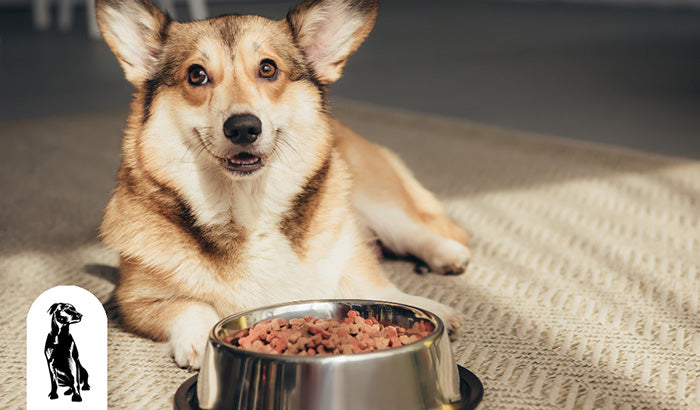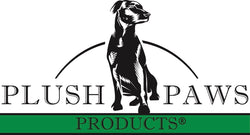
Choosing the right dog food is a big part of caring for your furry friend. You need to know more than what they eat; you need to understand what they need to stay happy and healthy. It's an important job for any pet owner.
This guide gives you a detailed understanding of canine nutrition, from essential macronutrients to the importance of vitamins and minerals. With a focus on science-backed information and practical advice, you will gain the knowledge needed to make informed decisions about your dog's diet, ensuring they receive the balanced nutrition required for a long, healthy life.
Canine nutrition is key to your dog's health, affecting everything from muscle to fur shine. Puppies need a diet based on their unique age, breed, and activity level.
Macronutrients:
- Proteins are essential for growth and immune function; look for high-quality sources like chicken and fish at the top of the ingredient list.
- Fats are necessary for energy and healthy skin; omega-3 and omega-6 fatty acids should be well-balanced, with a recommended ratio between 5:1 and 10:1.
- Carbohydrates provide energy and fiber, with complex carbs supporting gastrointestinal health. Be aware of the grain-free debate and choose whole-food sources.
- Vitamins and Minerals are crucial for bone health and immune support. Deficiencies can lead to health issues, so ensure your dog's food meets AAFCO standards.
Always consult a vet for personalized guidance, especially when adding supplements or addressing deficiencies.

Special nutritional considerations for different life stages
Puppies:
For dog owners of young puppies, it’s important to know they have different nutritional requirements to support their rapid growth and development.
Puppies need more proteins for body growth, fats for energy and brain development, and minerals like calcium and phosphorus for strong bones. Choose puppy-specific food labeled for growth, which ensures the right nutrient balance for their active bodies. Regular vet visits will help monitor their development and dietary needs.
Adult dogs:
As dogs enter adulthood, maintaining an ideal weight and supporting overall health becomes the focus.
As dogs reach adulthood, adjust their diet to fewer calories and maintain balanced protein and fat levels to prevent weight gain and support muscle health. Ensure their food provides a full range of nutrients. Choose a high-quality adult dog food that meets nutritional standards.
Senior dogs:
Aging dogs face various dietary challenges, from decreased metabolism to joint issues.
This section will provide insights into adjusting calorie intake, incorporating joint-supporting nutrients, and other considerations to keep your senior dog spry and healthy.
Senior dog owners need to be mindful of adjusting calorie intake, which is crucial for senior dogs to prevent obesity, which can strain aging joints. A lower-calorie diet suited for less active lifestyles is often necessary. Additionally, incorporating joint-supporting nutrients like glucosamine and chondroitin can help maintain mobility. Omega-3 fatty acids are also beneficial for reducing inflammation and supporting cognitive health.
Regular vet check-ups will help monitor weight and address any age-related health issues. Maintaining a consistent feeding schedule and providing easy access to food and water for senior dogs with mobility issues is also important.
Tailoring your dog's diet
As you've journeyed through the complexities of canine nutrition, remember that each nugget of knowledge equips you to better make informed decisions about your dog's diet. It's about more than filling a bowl; it's about understanding your dog's unique needs and how the right nutrients can unlock their best health.
Embrace this ongoing process with patience and care. Your dedication to understanding and meeting your dog's nutritional needs is a testament to the depth of your bond and your commitment to their well-being.
Recognizing and responding to food allergies and intolerances
Like humans, dogs can have allergies and intolerances to certain food ingredients. To identify food allergies in dogs, look for symptoms like itching, digestive issues, or ear infections.
Work with your vet on an elimination diet to pinpoint allergens by removing and then gradually reintroducing ingredients. Choose a hypoallergenic diet with novel proteins to avoid triggers and improve your dog's quality of life.
The impact of diet on dog behavior
Nutrition doesn't only affect the body; it can also have a profound impact on your dog's behavior. Explore how imbalances or deficiencies might contribute to issues like hyperactivity or anxiety and how the right diet can lead to a calmer, more balanced demeanor.
Dietary imbalances or deficiencies often lead to behavioral issues like hyperactivity or anxiety in dogs. Essential nutrients like omega-3 fatty acids and B vitamins are crucial for brain function and mood regulation.
A healthy gut also influences behavior, as a balanced gut microbiome aids in producing mood-regulating neurotransmitters. Incorporating a nutrient-rich diet that supports gut health can promote a calmer demeanor.
Tips for feeding picky eaters
Dealing with a picky eater can be frustrating, but here are some practical tips to encourage a healthy appetite:
- Vary Foods: Introduce a range of healthy options to see what your dog prefers. Sometimes a little change in flavor or texture, like adding a bit of wet food to dry kibble, can make a big difference.
- Establish a Routine: Consistency helps. Feed your pup its dog food at the same times each day and only leave the food out for a limited time. This creates a habit and sense of urgency to eat.
- Limit Treats and Extras: Too many treats or table scraps might fill your dog up, making them less interested in their regular meals.
- Create a Calm Eating Environment: Reduce stress and distractions during meal times. A quiet, relaxed space makes eating more appealing.
- Warm Up the Food: Sometimes, slightly warming the food enhances its smell and taste, making it more attractive to your dog.
- Exercise Before Meals: A good walk will stimulate your dog's healthy appetite. Make sure they have some time to settle down before eating.
- Understand Picky Behavior: Some dogs are naturally more selective. However, a sudden change in eating habits might indicate health issues.
- Seek Professional Help: If you've tried everything and your dog still isn't eating well, it's time to seek advice from a vet or a pet nutritionist. They can provide guidance tailored to your dog's specific needs.
Making the most of mealtime: interaction and bonding
Mealtime represents a valuable chance for interaction and strengthening bonds with your furry friend. Beyond merely providing nourishment, it's a perfect opportunity to engage your dog's mind and deepen your connection.
Consider incorporating puzzle feeders to stimulate their intellect and satisfy their foraging instincts. You can also integrate obedience training with treats during mealtime, turning a routine activity into an interactive learning session. Even the simple act of being present and offering gentle encouragement while your dog eats can reinforce trust and companionship.
You may even try varying the location of meals to include outdoor picnics or special spots in your home, making each meal a unique and enjoyable event. By transforming mealtime into a multifaceted experience, you enhance your dog's well-being and enrich the bond you share through these daily rituals.

Grasping and addressing your dog's dietary needs is fundamental for their well-being and joy. Selecting the appropriate nourishment tailored to their specific life stage and individual requirements isn't only about feeding them; it's about enriching their life and bolstering their health.
As you continue to shower your dog with love and dedication, remember that their diet is a critical aspect of your care, contributing significantly to a rewarding and healthy life shared together.
Complement their nutritional care with regular physical and mental stimulation. Engaging your dog in various activities isn't merely for enjoyment; it's a vital practice to manage and alleviate anxiety, foster a well-rounded temperament, and provide the necessary stimulation that indoor environments often lack.
From interactive games to regular walks and training sessions, these activities are essential in keeping your dog's mind sharp and their body fit, ensuring they lead a balanced and happy life.
Try Plush Paws!
At Plush Paws, we understand how important adventures are for your dog and have created products to make these experiences better. Our high-quality car seat covers cater to dog owners who often travel with their pets. They keep your car clean and provide comfort for your dog, whether you're heading to the park, going on a hike, or stopping by the pet store.
Our covers shield your seats from fur, dirt, and moisture while adding a touch of luxury. Made from durable materials, they're built to last and are easy to install, fitting most car models and coming in various styles to match your and your pet's taste.
We know every dog and car is different, which is why we offer a range of options. Our website makes it easy to find the right cover, and we're always here to help with top-notch customer service. Plus, we offer tips and resources for traveling with your pet, from keeping them calm on the road to finding dog-friendly spots.
Choose Plush Paws for the perfect car seat cover, and make your travels with your furry friend more enjoyable. Contact us today and start your next adventure together!
